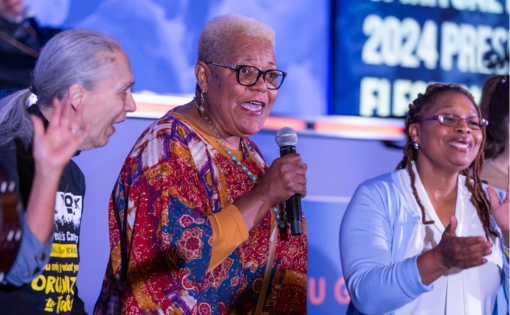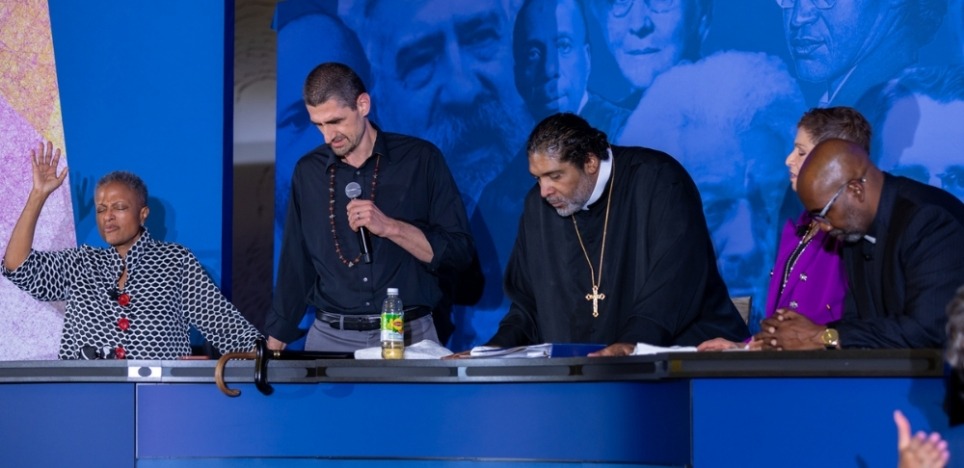On New Haven Green two weeks ago, in a church that believes “God is still speaking,” I looked around and felt a movement starting.
Dr. Cornel West was casually sitting to my left. To my right, a young man and young woman had moved into the aisles to dance. All around were bright and determined faces, mostly black and white.
Bishop William Barber was in the pulpit anointing a sanctuary full of preachers, activists, and public figures who’d been invited to the inaugural Center for Public Theology and Public Policy Conference at Yale University. Barber clarified our purpose, which was not to support one party or another, but to counter extremist forces opposed to democratic ideas like civil rights and the common good (clean air and water for everyone, for instance).
He kicked off our three days together by asking us to confront “heavyweight challengers” with more than “lightweight theology.” The seriousness of purpose was palpable. We reflected on what we were prepared to lose as we practiced “heavyweight theology,” the theology of the common good.
And then, Barber — who does not move easily, whose spine is partially fused due to arthritis — started dancing.
This usually stolid, building of a man was beaming, lifted by joy. In fact, we were all lifted — grave and lifted at the same time. Dancing and determined.
Seriousness of purpose and surges of joy marked our whole time together in New Haven.

Over the three days, I sometimes doubted that this really was the beginning of a movement, fearing that what I was feeling was just a mountaintop moment whose energy could not be sustained in the valleys of the real. But every time I doubted, there it was: the combination of seriousness of purpose and surges of joy.
The morning after our worship, we got to work. Nancy MacLean, author of Democracy in Chains, described the election of 2024 as “existential” for our democracy. It will determine, she said, how our children and grandchildren live. She detailed the sinister Project 2025, a plan to “dismantle the federal government, deregulate industry and eliminate consumer protections and public health measures, while installing a regime controlled by fossil fuel interests and the Religious Right.”
I had to take a big breath after that.
But then, panel after panel, we were given shots of joy that also came straight from reality:
Support for unions in those aged 30 and under is at its highest mark since 1965, across the political spectrum.
Majorities support universal healthcare, across the political spectrum.
Mobilization of poor and low-income workers — a large bloc who often have not voted — could stem the tide of extremism in every key state. Senator Dan Blue of North Carolina reminded us that NC responded to its extremist government by un-electing them. It then became the only state to raise the minimum wage.
How can we understand this coexistence of extreme threat and deep hope?
“A dying mule always kicks the hardest.” This is a South African proverb favored by Barber.
The threat to democracy is dire. And. The intensity and volume that characterize this threat come from the fear of its own death.
Intensity and volume are measurements, but they are not the same as numbers. Extremists fear the vote.
This election is existential for them, too. MacLean offered this: extremists like the architects of Project 2025 see 2024 as their last chance. So they are kicking the hardest.
The mule’s kicks are knocking loud and hard, but numbers will block the door. If we take action, we can bar the door against extremism and score a triumph for the common good, protecting civil rights for workers, people of color, indigenous communities, the poor, women, immigrants, and the queer and trans community.
We have to take action, and we have to sustain our energy. Here’s how:
If you are not feeling hopeful for the triumph of good, reflect further on the “dying mule” hypothesis. Take a look at another manifestation of this idea taken from Caroline W. Casey. Read the excerpt from her book and challenge yourself with a similar practice: Whenever you feel overpowered by the screaming of extremist policies and rhetoric, imagine them as simply outsized words, words that are gasping for air and losing energy with every gasp as the font becomes smaller and smaller.
If you are ready to practice combining seriousness of purpose with surges of joy, take these three steps:
1. Follow any of the conference’s presenters and their organizations on various media platforms: of course Barber, Repairers of the Breach, and the Poor People’s Campaign, but also Joy Reid, Roland Martin, Sarah McCammon, Forward Justice, and the Apache Stronghold.
Read The New Haven Declaration, which was released at the end of the conference and signed by hundreds of clergy.
2. Gather people together behind a call for the common good; do not do this work alone! Community and solidarity are essential, and joy multiplies and strengthens in company.
3. Put together a playlist of “movement music” and sing and dance together. Fill the playlist with songs that align with your goals and ideals, songs that move your feet and the needle of justice! Then pick your favorite track and share it with us via email, Instagram or Facebook. We will put together a Practicing Democracy compilation on YouTube and Spotify and debut it in a few weeks.
